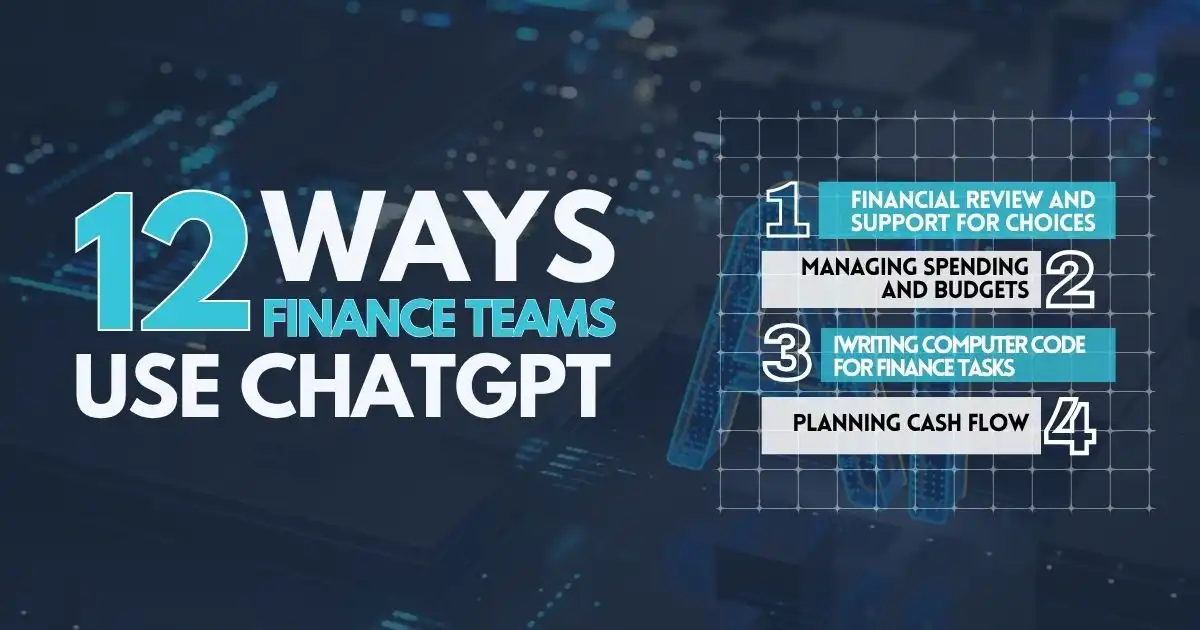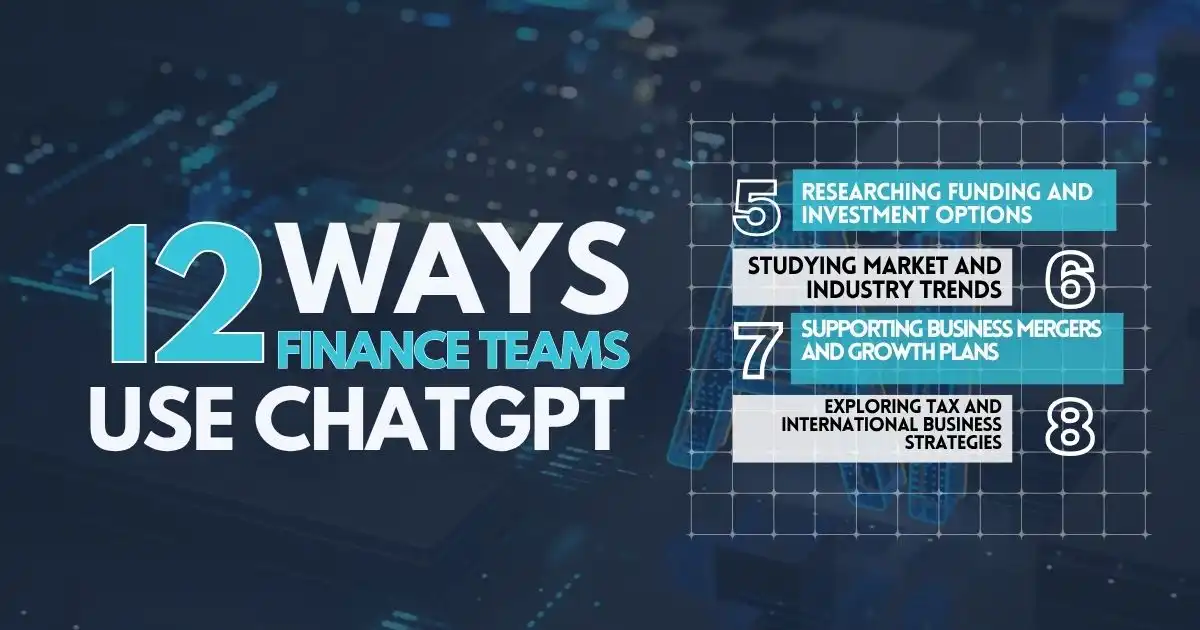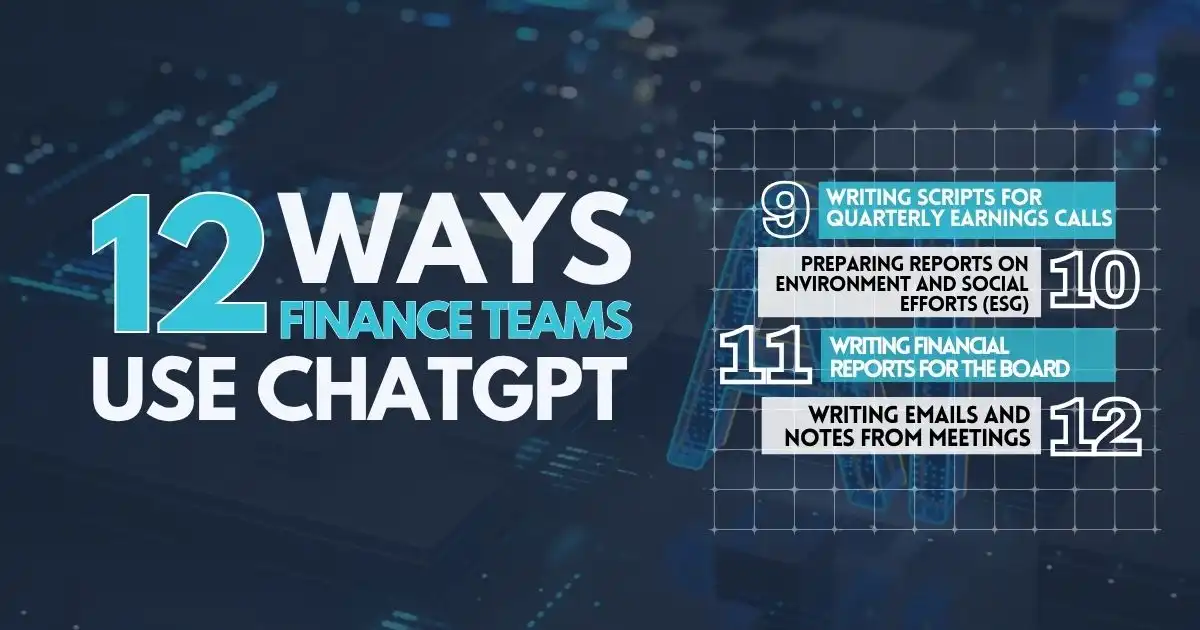You don’t need to overthink it—ChatGPT helps you write reports, sort numbers, and explain trends fast. These prompts are made for real FP&A tasks. Use them to plan better, cut wasted time, and sharpen your insights.
No fluff. Just clear examples that show how to get answers, clean up data, and communicate clearly using AI. Finance teams move fast—this helps you move faster.
So, how can you use ChatGPT in finance—right now, on the job, with the tasks you do every day?
Can You Use ChatGPT in Finance?

Yes. ChatGPT is a tool powered by artificial intelligence (AI) that understands and produces human-like text. In the field of finance, it can be used in many ways to help teams complete tasks faster and more accurately.
Finance professionals can use ChatGPT to write reports, keep track of spending and budgets, review financial data, plan cash flow, research business investments, manage funding options, and support better money-related choices.
Financial organizations such as banks also use ChatGPT for activities like checking customer risk levels, giving help to clients, making sure the company follows financial rules in different countries, and helping decide which loans to approve.
12 Ways Finance Teams Use ChatGPT
Here are the top ways finance and accounting professionals are using ChatGPT in real-world work:

1. Financial Review and Support for Choices
ChatGPT can study financial information like spending, revenue, and reports. It can find unusual items or errors that need to be checked by a human. After someone on the finance team reviews the output, it can help with creating summaries and supporting company decisions on where to cut costs or invest more.
Prompt 1:
“Here is our monthly profit and loss report. Can you find anything unusual or unexpected in the numbers?”
[Upload or paste data]
Prompt 2:
“Based on this financial summary, what areas should we review more closely to improve cost control?”
[Input key figures or trends]
2. Managing Spending and Budgets
ChatGPT helps track how money is being used in different areas of the business. It can help create computer scripts to organize expenses by type (e.g., travel, equipment). Some finance software, like Tipalti, includes ChatGPT to make it easier to check and label spending from supplier invoices and to answer staff questions using a digital assistant.
Prompt 1:
“Can you create a formula or script to tag each row in this expense sheet by category (e.g., travel, meals, supplies)?”
[Include sample data]
Prompt 2:
“Review this budget versus the actual report. Where did we overspend, and what patterns do you notice?”
[Provide spreadsheet data]
3. Writing Computer Code for Finance Tasks
Finance teams sometimes need small pieces of code to automate reports or calculations. ChatGPT can generate scripts for Excel macros or programming languages like Python. You can then copy the code into your system to use it for tasks like cleaning data, running simulations, or building charts.
Prompt 1:
“Write a Python script that reads a CSV of expenses and calculates totals by department.”
Prompt 2:
“Generate Excel VBA code that highlights any cell where the actual cost is more than 10% above the planned budget.”
4. Planning Cash Flow
Cash flow is about understanding how money moves in and out of the business. ChatGPT can help by creating simple models based on the recent income and expense data you give it. The finance team should always review the final numbers, but it can save time when building early versions of cash flow forecasts.
Prompt 1:
“Help me create a basic 3-month cash flow forecast using this list of expected revenues and expenses.”
[Provide cash flow items]
Prompt 2:
“Review this cash flow projection and suggest improvements for more accurate forecasting.”
[Paste your forecast]

5. Researching Funding and Investment Options
If your job involves finding new ways to raise money or invest funds, ChatGPT can compare different loans, investment accounts, or other financial products. You’ll need to include updated details like interest rates or market trends, but it can help sort options and summarize them in a report.
Prompt 1:
“Compare three short-term investment options for a business with $1 million in idle funds. Include pros and cons.”
Prompt 2:
“Help me prepare a summary of fixed-rate vs. floating-rate loans for a board presentation.”
6. Studying Market and Industry Trends
ChatGPT can help you gather and explain important data about the economy or your specific industry. This includes past trends, major risks, and how they could affect your business. You can feed it news articles, reports, or spreadsheets. This is useful if you work in strategy, market research, or company planning.
Prompt 1:
“Based on this recent article and uploaded report, summarize the top economic risks for small tech firms in 2025.”
[Include links or PDFs]
Prompt 2:
“Give me a short explanation of how inflation trends in 2024 might impact retail companies.”
7. Supporting Business Mergers and Growth Plans
If your company is looking to merge with or buy another business, ChatGPT can help you learn about the other company, their competitors, and typical prices paid in similar deals. It can help build a list of questions for due diligence or suggest steps for combining two companies after the deal is complete.
Prompt 1:
“Create a short overview of potential acquisition targets in the local e-commerce sector with $2M–$10M revenue.”
Prompt 2:
“List 5 key steps in the due diligence process when acquiring a software company.”
8. Exploring Tax and International Business Strategies
For companies operating in many countries, understanding taxes and legal rules is critical. ChatGPT can provide overviews of different tax systems or new tax laws. This helps finance and tax teams create better global strategies, avoid problems, and reduce costs.
Prompt 1:
“Summarize the corporate tax rules in Germany and what a U.S. company should know when expanding there.”
Prompt 2:
“Explain how changes to international tax laws under Pillar Two could affect our global structure.”

9. Writing Scripts for Quarterly Earnings Calls
Public companies talk to investors every few months to share updates. ChatGPT can help write the talking points and prepare for possible questions from investors and analysts. This ensures the leadership team is ready to clearly explain financial performance.
Prompt 1:
“Write a short earnings script for our CEO to present Q2 results: revenue +15%, expenses steady, net income up.”
Prompt 2:
“List possible questions that analysts might ask about our new product launch during the investor call.”
10. Preparing Reports on Environment and Social Efforts (ESG)
Many companies now report on how they care for the environment, treat people fairly, and lead their organizations responsibly (called ESG). ChatGPT can help research these topics, gather data, and draft reports that follow accepted standards.
Prompt 1:
“Draft a one-page ESG summary based on this input: reduced carbon emissions by 20%, started DEI hiring, donated 1% of revenue to education.”
[List or data]
Prompt 2:
“Summarize common ESG reporting standards and which one might fit a mid-sized manufacturing firm.”
11. Writing Financial Reports for the Board
CFOs and other leaders often report to the Board of Directors about how the company is doing. ChatGPT can help prepare early drafts of these reports, which include key charts, summaries, and recommendations. After review, these can be presented to guide big company decisions.
Prompt 1:
“Help me write a 1-page board summary for our financial performance this quarter. Focus on growth and risks.”
[Add data points]
Prompt 2:
“Using this financial dashboard, write an executive summary suitable for board review.”
[Paste dashboard metrics]
12. Writing Emails and Notes from Meetings
Finance teams use ChatGPT to help write clear emails, updates, and meeting summaries. You can upload a video meeting transcript (from Zoom or another platform), and ChatGPT can list what was discussed, what decisions were made, and next steps. Some platforms also use ChatGPT in real time to help during the meeting itself.
Prompt 1:
“Summarize this meeting transcript into a clean set of notes with actions assigned by name.”
[Upload transcript]
Prompt 2:
“Write an email update for our finance team summarizing this week’s key activities and decisions.”
[Provide short bullet list or notes]
Use ChatGPT to Strengthen Your Finance Operations
Reading about use cases and prompts is only the beginning. The real value comes when you take the next step and put these ideas into practice. Every report, every cash flow model, every investor call script is an opportunity to reduce manual effort and improve clarity, without hiring more people or adding more complexity.
The tools are available. The prompts are ready. And the results can speak for themselves.
You don’t need to use everything at once. Start small. Choose one task—like automating expense reviews or writing a monthly update—and try it with ChatGPT. Build confidence by testing, learning, and adjusting as you go.
Finance isn’t just about numbers. It’s about using time well, solving problems early, and communicating clearly. ChatGPT can support all of that.
So start today. Not because it’s trendy, but because it makes real work easier, faster, and more accurate. The sooner you use it, the sooner your team will see the difference.
FAQs
Can I use financial ChatGPT to get help with budgeting and planning?
Yes, financial ChatGPT can help create budgets, track expenses, and outline basic financial plans based on the information you provide. While it doesn’t replace a certified advisor, it’s a great tool for organizing your personal or business finances.
What kind of ChatGPT financial advice can I expect?
ChatGPT can offer general financial advice, such as explaining investment options, summarizing economic news, or outlining pros and cons of different saving strategies. However, it doesn’t provide personalized or regulated financial advice.
What is the best finance GPT model for financial tasks?
The best finance GPT currently available is GPT-4, especially in the ChatGPT Pro version. It supports file uploads, advanced reasoning, and dynamic financial modeling—making it ideal for tasks like forecasting and analysis.
How can I write a good ChatGPT financial advisor prompt?
A good ChatGPT financial advisor prompt should clearly describe your goal and provide relevant context (like income, expenses, or investment goals). For example: “Act as a financial advisor and help me build a monthly budget based on a $5,000 income and $2,000 in fixed expenses.”
